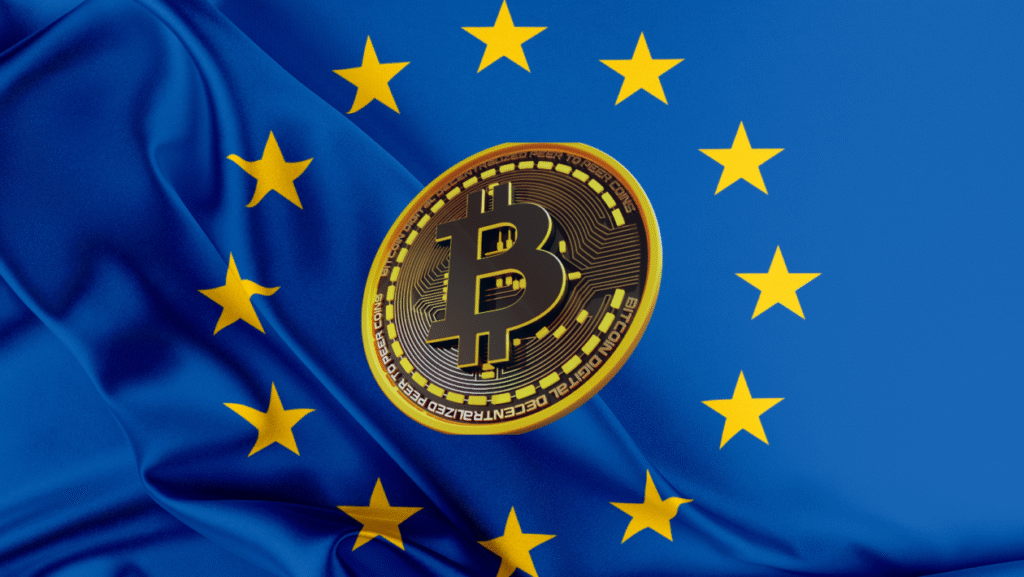In a landmark decision that solidifies Bitcoin’s march into the global financial mainstream, European regulators have officially approved the continent’s first spot Bitcoin Exchange-Traded Fund (ETF). This move, following the monumental success of similar products launched in the United States, is far more than a regional development. It is a seismic event, a second, powerful validation that is expected to unlock a new wave of institutional capital and accelerate the asset’s integration into the very fabric of the global financial system.

The approval is a testament to the maturation of the digital asset class and a clear signal that the world’s most developed economic blocs are now embracing a regulated future for Bitcoin. While the U.S. launch was the initial breach of the institutional wall, the European approval is the reinforcement that will turn that breach into a permanent, multi-lane highway for capital.
Building on the U.S. Precedent: From Breakthrough to Global Standard
The success of the U.S. spot Bitcoin ETFs provided an undeniable proof-of-concept. The staggering inflows, which saw billions of dollars pour into products managed by behemoths like BlackRock and Fidelity, demonstrated a massive, latent demand from investors who were waiting for a safe, familiar, and regulated on-ramp. These ETFs legitimized Bitcoin for a generation of financial advisors and asset managers, transforming it from a fringe tech asset into a portfolio-worthy allocation.
The European approval builds directly on this success but carries its own unique significance. Europe’s regulatory landscape, governed by frameworks like the Markets in Crypto-Assets (MiCA) regulation, is known for its comprehensive and often cautious approach. An approval within this system is not just a green light; it’s a powerful endorsement of the asset’s legitimacy and the robustness of the ETF structure itself. It signals to the world that Bitcoin is not just an “American phenomenon” but a globally recognized asset class ready for regulated prime time.
The European Advantage: Unlocking a New Continent of Capital
The immediate impact will be the unlocking of a vast and previously untapped pool of European capital.
- Access for Institutional Investors: European pension funds, insurance companies, and asset managers, many of whom were legally or logistically unable to invest in U.S.-domiciled ETFs, now have a local, compliant vehicle. This opens the door for a new, steady stream of institutional demand from some of the world’s most conservative and deep-pocketed investors.
- Wealth Management and Family Offices: A significant portion of European wealth is managed by a sophisticated network of private banks and family offices. A locally listed, regulated ETF provides them with the perfect tool to offer Bitcoin exposure to their high-net-worth clients, integrating it into traditional portfolio allocation strategies.
- Retail Democratization: For millions of European retail investors, buying Bitcoin through their existing brokerage account is infinitely simpler and feels safer than navigating crypto exchanges. This democratization of access is likely to spur a new wave of retail adoption across the continent.
The Global Ripple Effect: Beyond Europe’s Borders
The true significance of this event lies in the powerful domino effect it is expected to create around the world.
- Intensified Pressure on Other Regulators: With both the U.S. SEC and European regulators now on board, other major financial centers will face immense pressure to follow suit. The United Kingdom, Australia, Singapore, and Hong Kong—all of which have been cautiously exploring their own ETF products—will now see a clear and proven regulatory path forward. The question is no longer “if” they will approve a spot ETF, but “when.”
- A 24/7 Global Market Structure: The existence of liquid, regulated spot ETFs in both North American and European time zones fundamentally matures Bitcoin’s market structure. It allows for more efficient price discovery around the clock, reduces arbitrage opportunities between different venues, and adds a layer of stability to a market once known for its wild, timezone-specific volatility.
- Solidifying the “Macro Asset” Narrative: When the world’s two largest and most sophisticated economic blocs offer a regulated investment product for an asset, it transcends the “tech stock” or “digital collectible” narrative. Bitcoin’s role as a non-sovereign, global store of value—a form of “digital gold”—is cemented. It becomes a legitimate and necessary part of any global macro discussion, alongside currencies, commodities, and government bonds.
- Corporate and Banking Integration: A European ETF provides the regulatory clarity that local corporations and banks need. This could encourage more European companies to consider adding Bitcoin to their corporate treasuries as a hedge against inflation and currency debasement. Furthermore, traditional banks will be more inclined to build out their own custody and trading services for digital assets, knowing a large, regulated market exists.
Challenges and Considerations
The path forward is not without its complexities. The European market is more fragmented than the U.S., and the performance of these ETFs may vary across different national exchanges. Fee structures will be highly competitive, and it remains to be seen if European demand will be as explosive as the initial U.S. rush or if it will manifest as a slower, more deliberate accumulation.
Conclusion: A New Era of Global Legitimacy
The approval of a spot Bitcoin ETF in Europe is a pivotal moment, marking the transition from a U.S.-led breakthrough to a truly global phenomenon. It dismantles regulatory barriers, unlocks a massive new pool of capital, and exerts powerful pressure on other nations to embrace a regulated future for digital assets.
This event solidifies Bitcoin’s journey from the fringes of the internet to the core of the global financial system. It is no longer an experiment. It is an established macro asset with regulated on-ramps in the world’s most important markets. The long-term impact will be a more mature, stable, and globally integrated market, validating the vision that Bitcoin is not just a currency for a single nation, but a neutral asset for the world.